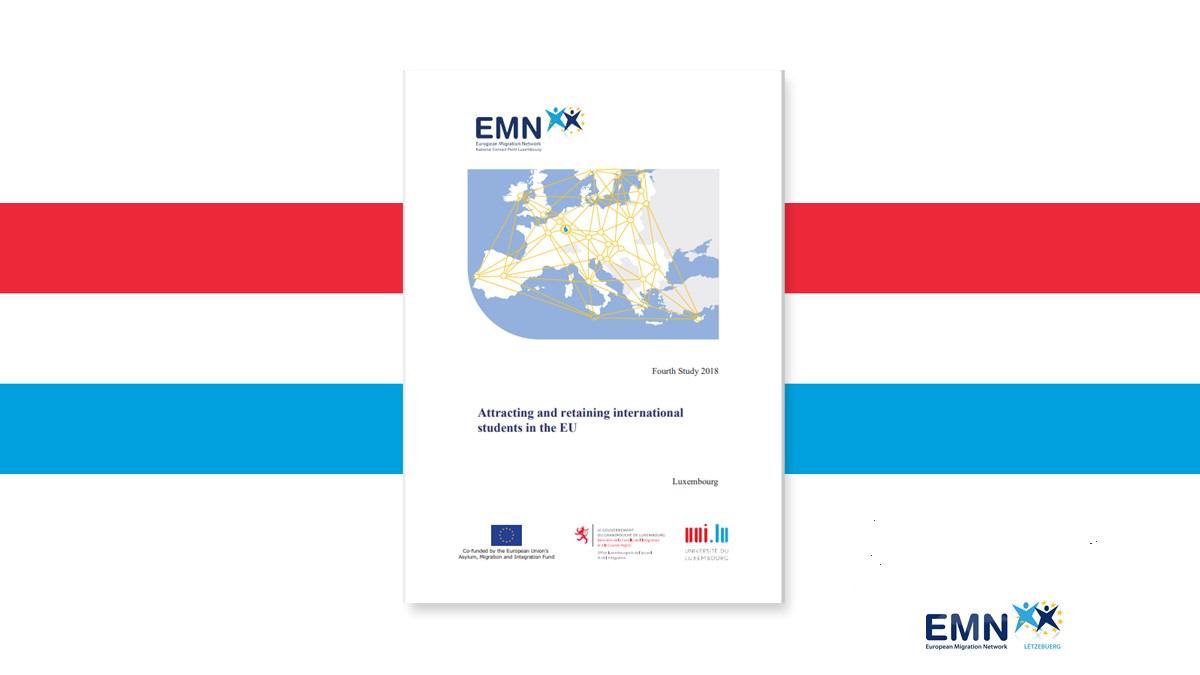The main objective of this study of the European Migration Network is to provide objective and reliable information about national practices in place in Luxembourg to attract and retain third-country national students.
Unlike many other EU Member States, the higher education system in Luxembourg is marked by a particular characteristic, namely the fact that the University of Luxembourg is the only public university in the country. Established by law in 2003, the University of Luxembourg is therefore the main actor in the higher education system and hosts the large majority of international students in Luxembourg (see statistical annex).
In addition to the University of Luxembourg, two more types of institutions complement the higher education system in Luxembourg and are recognised by the Ministry of Higher Education and Research as higher education institutions (hereafter referred to as ‘HEIs’), namely: 1. Secondary educational institutions offering educational programmes that award an advanced technician’s certificate (‘Brevet de technicien supérieur’ – ‘BTS’); 2. Private foreign universities having infrastructures or campus in Luxembourg. In order to be able to award higher education diplomas as well as to host international students, all HEIs are mandatorily required to be approved by the Ministry of Higher Education and Research, with the exception of the University of Luxembourg because it was established by law.
The admission conditions for international students to study at a HEI in Luxembourg are twofold: First, the international student must apply and be accepted at an approved HEI or at the University of Luxembourg. Second, once accepted at a HEI, s/he needs to apply for a temporary authorisation of stay, and subsequently, if applicable, a Visa D (valid for 3 months), from his/her country of origin before being authorised to travel to Luxembourg and before being issued a ‘student’ residence permit (valid for minimum 1 year and renewable) in Luxembourg. To conclude, the HEIs in Luxembourg, under the overall auspice of the Ministry of Higher Education and Research, as well as the immigration authorities are the main stakeholders in the context of international students studying in Luxembourg.
Luxembourg transposed the Directive (EU) 2016/801 by the Law of 1 August 2018, which amended the amended ‘Immigration Law’ and entered into force on 21 September 2018. In this context, the study highlights in particular the introduction of a new residence permit for ‘private reasons’ in view of seeking employment or establishing a business in Luxembourg. This residence permit was newly introduced by the transposition of the Directive and allows international graduates to remain in the country for a maximum duration of nine months in order to find a job or establish a business in relation to their academic training. Prior to the transposition, international students were only able to change their immigration status to ‘salaried worker’ immediately after their graduation. Moreover, the transposition modified a number of legal dispositions, such as the increase of the maximum amount of hours that students are authorised to work, from 10 hours to 15 hours per week. Furthermore, Bachelor students enrolled in their first year of academic studies as well as students enrolled in a study programme awarding them a ‘BTS’ are no longer excluded from exercising a salaried activity as allowed by law. Lastly, the transposition also facilitates the intra-European mobility of international students who follow a European or multilateral programme that contains mobility measures or a convention between two or more HEIs.
The attraction and retention of international students are not considered as a national political priority per se by the Luxembourgish authorities, but have to be perceived in an overall national political priority of attracting “talents” to Luxembourg, i.e. (highly) qualified persons, regardless of their nationality and in the interest of the country and its economy.
The stakeholders consulted in the context of this study identified several factors that may have positive effects on the attraction and retention of international students. These include, among others:
- the geographical position of Luxembourg with an important financial sector and several European institutions
- the multilingual environment of the country as well as the University of Luxembourg
- the HEI ranking of the University of Luxembourg
- the comparatively low levels of tuition fees, particularly of the national public HEIs
- the fact that the level tuition fees is the same for every student, no matter his/her nationality, with the exception of examples from private HEIs
Furthermore, the consulted stakeholders identified several examples of good practices in the context of this study, such as for example:
- A close and diligent collaboration between all stakeholders, in particular between the Directorate of Immigration, the Ministry of Higher Education and Research and the University of Luxembourg
- Quality management of private HEI (mainly through the approval procedure) in view of the best interest of students
- Affordable tuitions fees in the higher education system
At the same time, the consulted stakeholders have identified several challenges, such as:
- the languages of instruction (with a strong emphasis on French and German especially at the Bachelor/‘BTS’ levels) and the primary working languages (French and Luxembourgish)
- socio-economic factors, particularly the high costs of living and the challenge of finding affordable housing
- authenticity and veracity of transmitted diplomas in the context of a diploma recognition
- a challenging procedure related to the entrance exam for international students who hold a high school diploma issued in a country that is not a signatory country of Paris/Lisbon conventions
- potential misuse of the ‘student’ residence permit in view of trying to stay in the country instead of succeeding in the studies.
In addition to the major legislative change introduced by the transposition of the Directive and the various factors and challenges mentioned above, the study also highlights a number of initiatives, offered in particular by the University of Luxembourg, aiming to support international students after their graduation and to encourage them to establish and/or maintain a connection to the national labour market.
The study concludes with a section on bilateral and multilateral cooperation with third countries, both at the level of the Luxembourgish State as well as at the level of HEIs, particularly of the University of Luxembourg.

